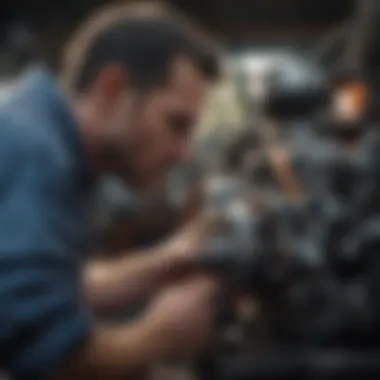Navigating the World of Salvage ATVs for Sale


Intro
Salvage ATVs present a unique opportunity for buyers seeking more affordable options in the recreational vehicle market. These vehicles have been deemed a total loss by insurance companies but can still be operational or easily repairable. Understanding the specifics of salvage ATVs can empower potential buyers to make informed investments. This article provides critical insights into the key considerations when searching for salvage ATVs for sale, covering market dynamics, legal compliance, insurance implications, and practical assessment methods.
Coverage Options
When considering a salvage ATV, buyers must think about the kind of insurance that is applicable. Salvage vehicles often come with unique challenges compared to traditional vehicles. In many cases, insuring a salvage ATV can be complicated. Therefore, knowing your coverage options is essential.
Types of Coverage Available
There are generally three primary types of coverage options available for salvage ATVs:
- Liability Coverage: This protects you if you are found at fault for an accident causing injury or property damage to another person.
- Collision Coverage: This helps pay for repairs to your ATV after an accident, regardless of who is at fault.
- Comprehensive Coverage: This covers non-collision-related incidents, such as theft, vandalism, or natural disasters.
Investing in the right kind of coverage can safeguard against unexpected costs that arise from potential accidents or damages. Each of these options has its nuances, especially when it comes to salvage vehicles.
Liability Coverage Explained
Liability coverage is crucial for any ATV owner, especially for those who acquire salvage units. It can be mandated by law, depending on your state or local regulations. This type of coverage ensures that if you cause an accident, the insurance will cover the damages inflicted on the other party. However, it does not cover your own injuries or damage to your ATV. Being aware of these legal obligations helps in understanding what is needed before you hit the road with your newly acquired salvage ATV.
"Owning a salvage ATV can be a rewarding yet complex endeavor; knowing how to protect your investment is the first step."
Key Considerations
When purchasing a salvage ATV, it is beneficial to evaluate several key factors that can influence your choice. Assessing these factors can help ensure a sound investment in a potentially valuable machine.
Factors to Assess When Choosing Insurance
Before acquiring an ATV, whether salvage or not, price is an important factor. Assess the overall condition of the ATV and the estimated repair costs. These details will influence not only your buying decision but also the kind of insurance policy you require. Furthermore, consider the following:
- The ATV's current market value
- Potential repair costs
- Availability of replacement parts
- Estimated depreciation over time
Evaluating these factors can provide insights into the total ownership cost and help determine an adequate insurance plan.
Understanding Policy Limits
Understanding policy limits is critical when it comes to insurance for salvage ATVs. A policy limit represents the maximum amount your insurer will pay for claims. Often, salvage vehicles may have lower limits than standard vehicles due to their risk profile. Make sure to clarify these limits with your insurance provider to avoid surprises in case of an accident or theft.
In summary, navigating the complexities of purchasing salvage ATVs for sale near you involves careful consideration of coverage options and the legal landscape. By arming yourself with the right knowledge and being attentive to detail, you will be better equipped to make a sound investment.
Understanding Salvage ATVs
The concept of salvage ATVs is pivotal for individuals seeking budget-friendly options in the off-road vehicle market. Grasping this topic not only informs buyers about potential options but also highlights the intricate details surrounding salvage vehicles. Many buyers might overlook important factors related to salvage ATVs, which can lead to unexpected difficulties after purchase. Understanding these facets allows consumers to navigate the market with confidence and discernment.
Defining Salvage Vehicles
A salvage vehicle, including ATVs, refers to any vehicle that has been declared a total loss by an insurance company. This status occurs when the cost of repairs exceeds the vehicle's actual cash value. Salvage vehicles often come with a salvage title, which indicates their status. Understanding this definition is the first step in considering a salvage ATV, as it impacts resale value and insurance.
Typical Causes for Salvage Designation
Salvage designation can arise from numerous situations. Some of the most common causes include:
- Collision Damage: An accident that severely impacts the structural integrity of the ATV, often making repairs impractical economically.
- Theft Recovery: If an ATV is stolen and later recovered, it may receive a salvage title if it has sustained damage or if significant mechanical parts are missing.
- Flood or Fire Damage: Water or fire can render an ATV unsafe or unrepairable, thus resulting in a salvage designation.
Each of these situations brings different challenges and considerations for potential buyers. Knowing the causes allows buyers to assess risks better.


Differences Between Salvage and Rebuilt ATVs
The distinction between salvage and rebuilt ATVs is crucial for understanding what you are purchasing. A salvage ATV remains in its original state, presented for sale without being repaired or restored. In contrast, a rebuilt ATV has undergone repairs to meet certain safety and functioning standards. This can include replacing damaged parts or making significant modifications.
- Salvage ATVs:
- Rebuilt ATVs:
- Typically sold "as is".
- May require extensive repairs before they can be safely used.
- Have been repaired to working condition.
- Generally qualify for standard registration and may be insurable under typical policies.
This differentiation is vital when making an informed decision. Buyers need to align their expectations with their intended use of the vehicle.
Market Overview for Salvage ATVs
Understanding the market for salvage ATVs is crucial for potential buyers. This section highlights current trends, popular brands, and considerations which can inform purchasing decisions. By familiarizing oneself with market dynamics, buyers can gain confidence in their choices while navigating the complexities of salvage vehicle ownership.
Current Trends in Salvage Vehicle Sales
The salvage ATV market has been experiencing notable changes. Many buyers are seeking budget-friendly options, leading to an increase in demand for salvage titles. More people are identifying salvage ATVs as a viable choice. Some are even attracted by the possibility of restoring them at a lower cost than purchasing new.
Recent trends indicate the following:
- Increased Online Listings: Online platforms are becoming the primary source for finding salvage ATVs. Sites like Facebook Marketplace, eBay Motors, and specialized auction platforms have seen an uptick in listings. This shift allows potential buyers to compare vehicles more easily, streamlining the buying process.
- Rising Popularity of DIY Repairs: There is a growing community of enthusiasts who enjoy working on salvage ATVs. The DIY culture encourages buyers to take on repair projects themselves, often sharing knowledge and tips online. This trend fosters a sense of community and empowerment among owners.
- Focus on Sustainability: Increasing environmental awareness has made salvage vehicles more appealing. Buying a salvage ATV decreases waste and incentives recycling components. This sustainable approach resonates with many, particularly younger buyers who prioritize eco-friendly practices.
Popular Brands and Models
The popularity of certain brands and models can significantly influence buyer choices in the salvage ATV market. Some brands maintain a solid reputation for durability and performance, making them more sought after.
- Honda: Honda ATVs are well-known for their reliability. The Honda FourTrax series stands out due to its ruggedness and powerful capabilities, making it a top pick for both casual and serious riders.
- Yamaha: The Yamaha Grizzly is another favored model. Riders appreciate its performance and comfort, especially for off-road adventures. Salvage units of this model are frequently available and can be an excellent investment if repaired carefully.
- Polaris: Known for their innovative features, Polaris models such as the Sportsman are popular choices. Their strong resale value keeps demand steady in the salvage market, drawing in buyers eager to restore them.
Overall, understanding the market landscape and specific brands helps potential buyers to make informed decisions, ensuring they select the right salvage ATV that suits their needs and budget.
Where to Find Salvage ATVs for Sale
Finding salvage ATVs for sale is a crucial step in the buying process. It requires knowledge of various sources, each offering different kinds of vehicles. By understanding where to look, buyers can increase their chances of finding a suitable ATV that meets their needs and budget. Importantly, many options are available, ranging from online platforms to local dealers. Each source has its unique advantages and potential drawbacks, making it necessary for buyers to evaluate them carefully.
Online Auction Platforms
Online auction platforms have become increasingly popular for purchasing salvage ATVs. Websites such as eBay Motors and Copart provide diverse listings of salvage vehicles from across the country. On these sites, buyers can often find detailed descriptions and images of the ATVs available for bid. The bidding process can lead to competitive prices, allowing savvy buyers to snag a great deal.
However, purchasing from online auction platforms comes with considerations. Buyers need to be aware of the auction terms and any associated fees. It’s also vital to scrutinize the vehicle's condition by reviewing all provided information thoroughly. Engaging in online bidding may require a higher degree of patience and research, but the potential cost savings can be substantial.
Local Dealerships and Salvage Yards
Local dealerships and salvage yards also serve as valuable resources for finding salvage ATVs. These establishments tend to have physical inventory that potential buyers can inspect in person. This tactile approach allows for a thorough assessment of the vehicle’s condition before making a purchase.
Moreover, local dealers often offer insights based on their expertise. They can provide advice regarding potential issues with specific makes and models. Salvage yards may have lower prices compared to dealerships, yet they may lack the same level of customer service or transparency.
In this context, it is essential to do research on local options. Make a list of nearby salvage yards and dealers, and visit them to compare the ATVs they have available. Building a relationship with these sellers can also yield valuable information about incoming vehicles that may not yet be listed.
Private Sales and Listings
Private sales and online listings are another avenue for sourcing salvage ATVs. Websites like Craigslist and Facebook Marketplace enable direct interactions between sellers and buyers. These platforms can offer competitive prices since sellers might be looking to offload vehicles quickly.
When engaging in private sales, it is crucial to approach with caution. Verify the seller's identity and ensure that you do not proceed with suspicious offers. Conducting due diligence is essential. Request the vehicle history, previous maintenance records, and any other relevant documents.


Also, arranging a meeting in person can allow for a thorough inspection of the ATV. This step reduces the risk of being misled by poorly represented listings. Although bargaining may be possible, respectful communication is key to fostering a successful transaction.
When searching for salvage ATVs, combine multiple sources to maximize your chances of finding the right vehicle.
Overall, understanding where to find salvage ATVs for sale allows buyers to make informed decisions. Whether through online auctions, local dealers, or private listings, buyers can explore various options and weigh up their pros and cons.
Evaluating the right source often leads to securing a reliable salvage ATV.
Evaluating a Salvage ATV
Evaluating a salvage ATV is essential for anyone considering purchasing one. It involves critical assessment of various factors that can significantly influence not only the safety and operation of the vehicle but also its long-term value. In many cases, salvage ATVs might be available at a lower price point, but a thorough evaluation is necessary to ensure that savings do not come with hidden costs. Understanding how to properly evaluate these vehicles allows buyers to safeguard their investment while maximizing the potential benefits of ownership.
Conducting a Thorough Inspection
When it comes to salvage ATVs, conducting a thorough inspection is non-negotiable. Buyers should look for any notable damage these vehicles sustained prior to their salvage designation. Start by checking the frame for bends or cracks. This is an important indicator of whether the ATV can hold up under normal conditions. Inspecting the suspension components for wear and tear is also crucial. Missing parts can lead to expensive repairs down the road.
Moreover, examine the engine for signs of leakage or corrosion. Listen for any unusual noises during a test run. This can reveal issues that may not be immediately visible. Tires should also be in decent condition since replacing them can be costly. Overall, a comprehensive inspection can unveil critical information to assess before making a purchase decision.
Assessing Repair Costs Versus Market Value
Assessing repair costs versus market value is another pivotal aspect of evaluating a salvage ATV. Buyers should obtain estimates for any repairs that might be needed to bring the vehicle to full working order. This means accounting for costs tied to mechanical fixes, bodywork, or even parts replacements. Understanding these costs can aid in determining whether the purchase is viable.
Next, compare these repair costs against the market value of similar, fully operational ATVs. Resources like Kelley Blue Book can provide insight into what these vehicles are typically worth. This is a key exercise as it helps establish whether the total investment remains reasonable. If repair costs exceed the potential value of the ATV, it may be wise to reconsider the purchase.
Understanding Vehicle History Reports
Understanding vehicle history reports is essential for potential buyers. These documents provide vital information about prior incidents, repair history, and even title status. Most salvage ATVs come with a title that has been marked as salvage, but the details of what led to that designation can vary. Reviewing the history report can help reveal whether the salvage title is due to minor accidents or more serious structural issues.
Additionally, some services provide insights into if and when the ATV has had major repairs. This can flag any red flags about the quality of those repairs. Such insights can greatly affect your buying decision and potential investment in the long run.
A thorough inspection, assessing repair costs, and understanding the history of the ATV can significantly reduce the risk of making a poor investment.
Legal Considerations in Salvage Purchases
Understanding the legal implications surrounding salvage ATVs is essential for any potential buyer. Laws vary significantly by state and region, which can impact the purchase process, ownership rights, and overall value of the ATV. By navigating these legal facets, buyers can protect themselves and their investments, ensuring a smoother transaction.
State-Specific Regulations
Each state in the United States has its own regulations regarding salvage vehicles. These regulations can dictate how salvage titles are issued, what repairs may need to be completed before the vehicle can be registered, and how the vehicle can be used legally.
Here are some key considerations regarding state-specific regulations:
- Title Legislation: Some states require a salvage title to clearly state that the vehicle has been deemed salvage. Knowing your state’s title laws helps buyers understand the status of the vehicle.
- Inspection Requirements: Certain states demand inspections before re-registration. This ensures that the ATV meets safety standards and is roadworthy.
- Insurance Considerations: State laws also impact what types of insurance are necessary for salvage vehicles. Understanding these can help avoid legal pitfalls down the line.
For detailed regulations by state, resources like en.wikipedia.org can provide comprehensive insights.
Re-registration of Salvage Vehicles
Re-registering a salvage ATV can involve multiple steps. This process can vary depending on the state regulations but typically includes the following actions:
- Documentation Preparation: Collect all required documents, including the original salvage title and proof of repairs.
- Application Submission: Fill out the application for registration with the local DMV or equivalent agency. Ensure that all information is accurate to avoid delays.
- Inspection: Most states will require an inspection by a licensed official. This signifies the ATV’s condition and confirms whether it meets safety standards.
"Re-registering a salvage vehicle can be bureaucratically intensive, but it is crucial for compliance with local laws."
In summary, the legal considerations are vital when exploring salvage ATVs for sale. By being informed about state regulations and the re-registration process, buyers can make decisions that protect their interests and ensure that their purchase aligns with legal requirements. Proper attention to these details helps in navigating the complexities of the salvage vehicle market.


Insurance Implications for Salvage ATVs
Understanding insurance implications for salvage ATVs is crucial for anyone considering a purchase. Salvage vehicles can pose unique challenges in terms of insurance coverage. As a buyer, knowing how to navigate this landscape can save money and avoid future problems.
Understanding Coverage Options
When it comes to salvage ATVs, it is vital to explore the various coverage options. Standard auto insurance may not apply to a salvage title vehicle. This vehicle may require specialized coverage. These policies often include liability, collision, and comprehensive options.
Liability insurance is essential for all vehicle owners. It protects you from costs if you are at fault in an accident involving injury or damage to property.
Collision coverage pays for repairs to your vehicle after an accident. However, many insurers may offer limited payouts for salvage vehicles given their lower market value.
Comprehensive insurance covers damage from non-collision incidents like theft or natural disasters. Many sellers may opt for this insurance. Safeguarding against unforeseen incidents can be beneficial.
Buyers need to compare policies and ensure they understand what each coverage entails.
Obtaining Insurance Quotes for Salvage Vehicles
Obtaining insurance quotes for salvage vehicles is necessary before making a purchase decision. This process can highlight potential costs and help gauge the overall financial impact of the acquisition. Not all insurance companies insure salvage ATVs, so starting the search early is critical.
Here are steps to consider for obtaining quotes:
- Research insurance providers that specialize in salvage vehicles.
- Contact multiple insurers for comparative quotes. Increase your chances of finding the best deal.
- Be ready to provide details about the vehicle, including its make, model, year, and previous damages.
By taking these steps, buyers can ensure they secure a policy that meets their needs at a reasonable price.
Evaluating Liability Coverage
Evaluating liability coverage for salvage ATVs requires careful consideration. The liability limits chosen can significantly affect the owner’s financial exposure in the event of an accident.
When choosing liability coverage, consider:
- State requirements: Different states have specific minimum insurance requirements. Ensure your policy meets those standards.
- Personal risk tolerance: Assess how much potential risk you are comfortable with when it comes to liability.
- Cost versus coverage: Cheaper policies may offer less protection. Ensure that you are not sacrificing essential coverage for a lower premium.
Pros and Cons of Buying a Salvage ATV
When considering the acquisition of a salvage ATV, it is essential to understand both the benefits and drawbacks associated with this choice. Salvage ATVs can present unique opportunities and potential pitfalls, thus having a detailed understanding aids in making a well-informed decision. This section provides insights into the advantages of ownership and the potential risks involved, highlighting why these considerations are critical for prospective buyers.
Advantages of Ownership
- Cost Savings: Salvage ATVs often come at a significantly lower price point compared to their counterparts. This price advantage can allow buyers to access models they may not afford as new or slightly used.
- Potential for Customization: Many buyers relish the opportunity to customize their ATV. With salvage vehicles, there is room for personal touches that can enhance performance or aesthetic appeal without the constraints of a warranty.
- Learning Experience: Engaging with salvage ATVs can be an educational journey. Buyers can gain firsthand experience in repairs and modifications, which can enhance their mechanical understanding and skills.
- Environmental Benefits: Purchasing salvage vehicles is often seen as an eco-friendly choice. It promotes the reuse of materials and extends the lifecycle of the vehicle.
"Investing in a salvage ATV can lead to substantial savings and offers unique opportunities for customization and learning."
Potential Risks and Disadvantages
- Uncertain Repair Costs: While the initial purchase may be cheaper, repair expenses can become unpredictable. An ATV may require extensive work, which could negate any financial benefits.
- Limited Warranty Options: Many salvage ATVs are sold with limited or no warranty. This means that if repairs are needed shortly after the purchase, the financial burden falls entirely on the owner.
- Resale Value Concerns: Salvage vehicles generally have a lower resale value. If the buyer decides to sell the ATV in the future, it may not appreciate as a non-salvage model would.
- Insurance Complications: Obtaining adequate insurance on a salvage ATV may pose challenges. Some companies may be hesitant to provide full coverage, which could leave owners vulnerable in the event of an accident.
In summary, prospective buyers of salvage ATVs must approach their decision with a balanced perspective, weighing both the advantageous aspects and potential disadvantages. A thorough evaluation enables buyers to form a robust understanding, ultimately aligning their expectations and financial plans with their purchase.
Ending
The conclusion of this article serves as a necessary recap and reflection on the complex landscape of purchasing salvage ATVs. It is important because it synthesizes critical information gathered throughout the article, allowing potential buyers to revisit key concepts and insights before making their purchasing decisions. In a market where many options exist, understanding the benefits and risks is paramount.
Summarizing Key Points
- Understanding Salvage ATVs: Knowledge of what constitutes a salvage vehicle helps buyers differentiate among options. It is essential to know the reasons behind a vehicle's designation and how it differs from rebuilt ATVs.
- Market Overview: An insight into current trends and popular brands gives buyers an edge in navigating the market effectively.
- Finding Salvage ATVs: Different sourcing methods include online platforms, local dealerships, and private sales. Recognizing these channels aids in broadening the search.
- Evaluating Purchases: Conducting thorough inspections and understanding costs versus market value is crucial. Buyers must be equipped to assess also the vehicle history to avoid potential pitfalls.
- Legal and Insurance Considerations: Familiarity with state regulations and insurance implications provides a framework for safe transactions. A proper understanding here prevents unexpected difficulties post-purchase.
- Pros and Cons: Finally, recognizing both advantages and disadvantages allows buyers to weigh their options more effectively.
By addressing these points, the article establishes a strong foundation for buyers who seek salvage ATVs.
Final Thoughts on Salvage ATV Purchases
Ultimately, buying a salvage ATV can be a rewarding experience, provided one approaches it with due diligence and caution. As outlined, the advantages include potential cost savings and the opportunity for repair and customization. However, the existence of risks cannot be ignored. Issues such as hidden damages, higher repair costs, or potential legal complications are realities that buyers must consider.



